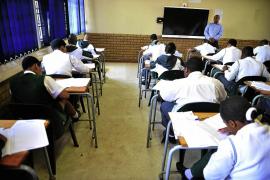
Let us all support the Class of 2025
Let us all support the Class of 2025 With the end of August marking the start of the matric class of 2025’s preliminary examinations, we all have a responsibility to give them the extra support they need, as they take the next step towards becoming responsible adults of tomorrow. Exams come with heightened levels of fear and anxiety around mathematical formulas and the like, and all parents, guardians, siblings and society at large, should chip in to ease these fears. Learners sitting for the prelims across the country, will likely share similar fears as these exams are a step closer to the all-important October/November final exams that mark the end of the Class of 2025’s high school career. These prelims are a litmus test of what is to come when our Matrics sit for their finals, and it should be seen as just as important. Caregivers can extend an encouraging word or two to their beloved matrics who will be sitting for various papers. A pep talk, for example, on how the exams are going, can be helpful to relieve some of the pressure and a care pack of their favourite treats will also likely put a smile on their dial. Reducing their daily chores will also demonstrate thoughtfulness, as they burn the midnight oil in earnest. To help learners prepare for the exams, schools often have revision, and extra lessons are often held over weekends to assist learners with their studies. The Department of Basic Education also has the Mind the Gap study Guides for learners. The study guides are aimed at improving the academic performance of Grade 12 candidates and are available for various subjects including Accounting, Life Sciences and Economics. Additionally, the department also has Practical Assessment Tasks guidelines for those registered for subjects like Agriculture: Agricultural Management Practices and Agricultural Technology; and Life Orientation among others. Learners can also use previous exam papers to revise and prepare for the final National Senior Certificate (NSC) exams that begin in October. The papers as well as the guidelines and study guides are accessible on the department’s website (https://www.education.gov.za). While exams provide plenty a dish of nervousness, learners should walk into the various exam halls with confidence that they have prepared sufficiently when they put pen to paper. This is despite the hardships they may have had in getting to grips with the subject matter or learners who were at the mercy of mother nature’s adverse weather that battered parts of the country, including the Eastern Cape, not so long ago. While government has been assisting flood-ravaged communities, we take our hats off to leaners and their teachers who have kept track of their academics in the midst of challenging times. Our support in helping them to reach their academic goals will help our country in producing the leaders and captains of industry of tomorrow. Education is an important item in any society’s toolbox. Addressing the current challenges the country faces, including poverty, inequality and the materialising effects of climate change, requires innovation and foresight that will also help anticipate the challenges of tomorrow. The learners of today and tomorrow are a crucial part of that toolbox if South Africa is to overcome challenges and move towards a better life for all. And yes, many wonder whether the learners who are about to complete their schooling and become graduates in many a field will be able to find work given the high unemployment rate. And while unemployment is a very real challenge, learning cannot come to a halt if the country has ambitions of being progressive. The future world requires education, and the country needs young, innovative people, who will acquire coding and other skills that the future demands. Employment and entrepreneurship will have to be a part of the future South Africa. In June, Deputy President Paul Mashatile announced that the country has ratified the Protocol for Women and Youth in Trade, under the African Continental Free Trade Area, as a way of fostering inclusive growth. Speaking at the High-Level G20 Intergenerational Roundtable, hosted by the National Youth Development Agency (NYDA), the Deputy President said the milestone is not just a symbolic gesture, but a move that operationalises the inclusion of woman-led and youth-led enterprises in regional and global value chains. This it does by the removal of structural trade barriers, prioritising access to information, finances, and markets, as well as requiring state parties to create enabling legal and policy environments for inclusive economic participation. Government has also put in place measures such as the Youth Employment Service (YES) initiative which has to date provided over 190 000 young people with year-long work experience opportunities as a means of addressing unemployment. As society, we need to support the dreams of not only the Grade 12 learners who will step into the exam rooms to face their prelims, but all learners across the country. They need to know that we believe in them and are hopeful of a bright future for them. In the same vein, we need responsible learners who will not take up cheating in any of their exams or bully other learners to do their exam preparation for them. If a learner does not do well in this round of exams, they must not give up hope - but realise they can up the ante in the final exam. The country does not need leaked papers either, but a mutual respect between learners, teachers and those working across the various exam halls. The country stands fully behind the matric class of 2025. - SAnews.gov.za *Neo Semono is a Features Writer/Editor at SAnews.gov.za Neo Fri, 08/29/2025 - 13:57 64 views